|
|
|
Sort Order |
|
|
|
Items / Page
|
|
|
|
|
|
|
| Srl | Item |
| 1 |
ID:
128206
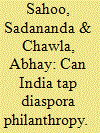

|
|
|
|
|
| Publication |
2014.
|
| Summary/Abstract |
International migration and diaspora has been one of the integral parts of the recent development discourse in academics as well as the policy domain, especially in the context of developing countries. Diaspora is seen as one of the emerging development actors as diaspora is perceived as creating economic, social and political capital through global network (Gaillard 1991, Meyer Brown 1999). Multilateral organizations have taken note of the significance of diasporic contribution towards the global development.
|
|
|
|
|
|
|
|
|
|
|
|
|
|
|
|
| 2 |
ID:
125906
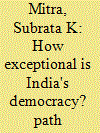

|
|
|
|
|
| Publication |
2013.
|
| Summary/Abstract |
India in 1947 faced the challenge of transforming a poor, socially and spatially fragmented country with low literacy and violent memories of Partition to a democratic state and a cohesive nation. Though the country sorely lacked the "pre-conditions of democracy," it still made a successful transition to electoral democracy, and went on to consolidate it. Compared to other South Asian nations, India's democracy appears even more puzzling-common origin from British colonial rule has led to dissimilar outcomes among India's neighbors. I argue in this article that India's democracy is neither a sham nor idiosyncratic. India's transition to democracy is the outcome of general variables such as path dependency, adroit institutional arrangements, strategic policy reform, and political capital. India's democracy conflates Western liberal democratic forms and non-Western cultures, leading to enfranchisement, entitlement and empowerment of the citizens, and the creation of a sense of efficacy, social justice, legitimacy and trust among them.
|
|
|
|
|
|
|
|
|
|
|
|
|
|
|
|
| 3 |
ID:
103104
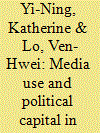

|
|
|
| 4 |
ID:
159258


|
|
|
|
|
| Summary/Abstract |
This article explores the politics of older women in post-Soviet Kyrgyzstan, who have emerged as informal leaders in urban neighbourhoods to ‘speak for the poor’ to the state. Their mediating role is crucial for understanding community micro-politics, women’s political agency and more broadly state–society relations in the post-Soviet context. Drawing on in-depth interviews with older female informal leaders, the paper examines their political legitimacy and modes of mediation with the state and elites. Using Bourdieu’s concepts of political capital and ‘double dealings’, the paper argues that older women are important informal mediators, whose representational practices involve communal leadership, protest activism, bargaining and vote mobilization. Their multitasking roles are necessitated by their legitimation struggles and elites’ strategies of state capture. The article challenges the dominant media representation of older women activists as ‘a mob for hire’ and offers a more nuanced account of older women’s politics, addressing a blind spot in the literature on politics in Central Asia.
|
|
|
|
|
|
|
|
|
|
|
|
|
|
|
|
| 5 |
ID:
147188
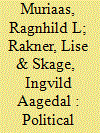

|
|
|
|
|
| Summary/Abstract |
The cases of the African National Congress (ANC) in South Africa and the Movement for Multiparty Democracy (MMD) in Zambia show major differences in the extent to which incoming ruling parties after a regime change build strong party systems. The ANC institutionalised a hegemonic party apparatus after coming to power, while the MMD did not. These differences, we contend, are related to the ANC’s history of a prolonged struggle that included violent conflict in contrast to the MMD’s peaceful pro-democracy campaign. Theorising this contrast provides a framework for investigating causes of different outcomes in party institutionalisation after regime change.
|
|
|
|
|
|
|
|
|
|
|
|
|
|
|
|
| 6 |
ID:
137952
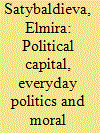

|
|
|
|
|
| Summary/Abstract |
Using the Bourdieusian framework to analyse the nature of social stratification in rural Kyrgyzstan, this article examines how local politics is strategised by different groups in the social field. The article suggests two modifications to the Bourdieusian framework to reflect better the nature of local politics. First, despite lacking significant capital holdings, poor groups undertake everyday resistance and mediated politics. Second, intellectual and traditional elites engage in the politics of ‘doing the right thing’, motivated by a sense of moral obligation. The article provides a critical challenge to the concept of clan and elite-led politics which is often used to explain events in Central Asia.
|
|
|
|
|
|
|
|
|
|
|
|
|
|
|
|
|
|
|
|
|